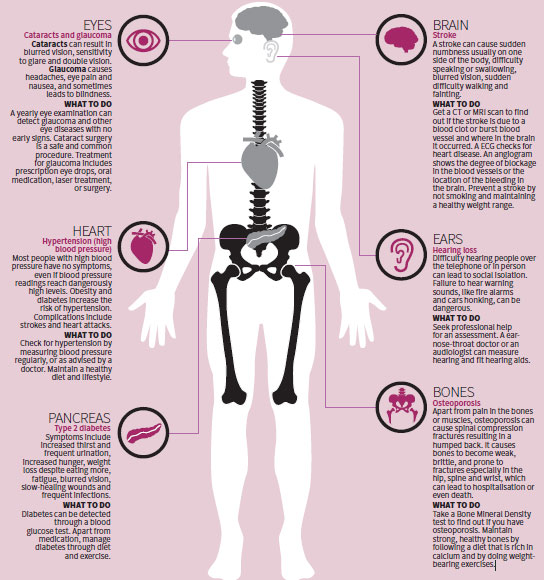As we grow older, we are faced with an increasing number of major life changes, including our health. Learn about common health issues facing the elderly and what you can do to stay healthy.
There are some common health concerns as you age, even when you are in relatively good health. Although you are not able to control every factor that affects your health, there's a lot you can do to reduce your risks, improve your health and live longer.
The key is to know the signs and symptoms of common health conditions that affect the elderly and take early action to manage them.
7 Common health conditions faced by seniors
Here are 7 common health conditions that can develop in your golden years and preventive care tips. If you have any questions or concerns about your health, be sure to talk to your healthcare provider.

Eyes
Cataracts can result in blurred vision, sensitivity to glare and double vision.
Glaucoma causes headaches, eye pain and nausea, and sometimes leads to blindness.
What to do
A yearly eye examination can detect glaucoma and other eye diseases with no early signs. Cataract surgery is a safe and common procedure. Treatment for glaucoma includes prescription eye drops, oral medication, laser treatment, or surgery.
Heart
Hypertension (high blood pressure)
Most people with high blood pressure have no symptoms, even if blood pressure readings reach dangerously high levels. Obesity and diabetes increase the risk of hypertension. Complications include strokes and heart attacks.
What to do
Check for hypertension by measuring blood pressure regularly, or as advised by a doctor. Maintain a healthy diet and lifestyle.
Pancreas
Type 2 diabetes
Symptoms include increased thirst and frequent urination, increased hunger, weight loss despite eating more, fatigue, blurred vision, slow-healing wounds and frequent infections.
What to do
Diabetes can be detected through a blood glucose test. Apart from medication, manage diabetes through diet and exercise.
Brain
Stroke
A stroke can cause sudden numbness usually on one side of the body, difficulty speaking or swallowing, blurred vision, sudden difficulty walking and fainting.
What to do
Get a CT or MRI scan to find out if the stroke is due to a blood clot or burst blood vessel and where in the brain it occurred. An ECG check for heart disease. An angiogram shows the degree of blockage in the blood vessels or the location of the bleeding in the brain. Prevent a stroke by not smoking and maintaining a healthy weight range.
Ears
Hearing loss
Difficulty hearing people over the telephone or in person can lead to social isolation. Failure to hear warning sounds, like fire alarms and cars honking, can be dangerous.
What to do
Seek professional help for an assessment. A ear-nose- throat doctor or an audiologist can measure hearing and fit hearing aids.
Bones
Osteoporosis
Apart from pain in the bones or muscles, osteoporosis can cause spinal compression fractures resulting in a humped back. It causes bones to become weak, brittle, and prone to fractures especially in the hip, spine and wrist, which can lead to hospitalisation or even death.
What to do
Take a Bone Mineral Density test to find out if you have osteoporosis. Maintain strong, healthy bones by following a diet that is rich in calcium and by doing weight bearing exercises.
Ref. R14
Source: Health Promotion Board
